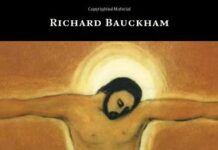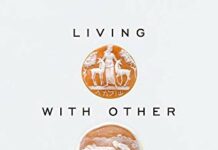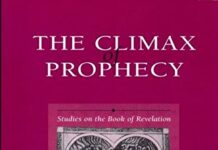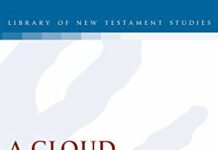
Ebook Info
- Published: 2017
- Number of pages: 704 pages
- Format: PDF
- File Size: 3.87 MB
- Authors: Richard Bauckham
Description
A groundbreaking work in New Testament studies expanded and updated Winner of the 2007 Christianity Today Book Award in Biblical Studies, this momentous volume argues that the four Gospels are closely based on the eyewitness testimony of those who personally knew Jesus. Noted New Testament scholar Richard Bauckham challenges the prevailing assumption that the Jesus accounts circulated as “anonymous community traditions,” asserting instead that they were transmitted in the names of the original eyewitnesses. In this expanded second edition Bauckham is adding a new preface, three substantial new chapters that respond to critics and clarify key points of his argument, and a comprehensive new bibliography.
User’s Reviews
Editorial Reviews: Review PRAISE FOR THE FIRST EDITION:N. T. Wright “The question of whether the Gospels are based on eyewitness accounts has long been controversial. Richard Bauckham, in a characteristic tour de force, draws on his unparalleled knowledge of the world of the first Christians to argue not only that the Gospels do indeed contain eyewitness testimony but that their first readers would certainly have recognized them as such. This book is a remarkable piece of detective work, resulting in a fresh and vivid approach to dozens, perhaps hundreds, of well-known problems and passages.”James D. G. Dunn “Another blockbuster from the productive pen of Richard Bauckham. . . . Not to be missed!”Graham Stanton “Shakes the foundations of a century of scholarly study of the Gospels. There are surprises on every page. A wealth of new insights will provoke lively discussion for a long time to come. Readers at all levels will be grateful for Bauckham’s detective work that uncovers clues missed by so many.”Times Literary Supplement “Bauckham’s careful and eloquent presentation of his argument, supported not just by careful scholarship but by admirable common sense, deserves earnest consideration by all.”Choice “It will be hard to take seriously future works on the origin of the Gospels that have not interacted with Bauckham. . . . Recommended.”Martin Hengel “Fascinating! . . . This book ought to be read by all theologians and historians working in the field of early Christianity. Further, Bauckham’s convincing historical method and broad learning will also help pastors and students to overcome widespread modern Jesus fantasies.” — Expository Times “This new edition is no mere tweaking of the first edition. . . . Its reissue, in expanded form, leads one to ponder anew some of its central claims, which in turn open up perennially important issues for understanding the transmission of the Jesus tradition during its earliest stages.” About the Author Richard Bauckham is professor emeritus of New Testament studies at the University of St. Andrews, Scotland, senior scholar at Ridley Hall, Cambridge, and a fellow of both the British Acad-emy and the Royal Society of Edinburgh. His many other books include Jesus and the God of Israel, Gospel Women, and Jesus: A Very Short Introduction.
Reviews from Amazon users which were colected at the time this book was published on the website:
⭐This is one of the best books on the evidence of the resurrection (both inside and outside of the Gospels), and I highly recommend it. This particular book provides a very in depth, detailed analysis of the gospel writings themselves. However, it reads a bit like a college textbook, and costs a good bit. So “Did Jesus Really Rise from the Dead?” by Carl Olson might be a shorter, easier, cheaper read for those just starting on this topic. But honestly if you are a reader and willing to take your time going through it, then you can’t go wrong with this book, which is fantastic and covers everything in detail. It really helped make a believer out of me. (“Jesus outside the New Testament” and “Searching for Jesus” are also good reads on this topic, and since they go beyond the Gospels they cover elements of proof not discussed in this book – frankly I would say you should read them all…)
⭐In this book, Mr. Bauckham advances a case that the Gospels were written with eyewitness testimony as a basis. I think it is fair to say the author deals most extensively with the Gospel of Mark of the Synoptics and the Gospel of John as a separate case.This theory is not universally accepted, not without controversy and would place the authorship of the gospels at an earlier date than others accept. He further argues against theories that associate the authorship of the Gospels with schools of thought or that discount the weight of testimony as historically significant.Readers who are not biblical historians or deeply immersed in the arguments he addresses, as I am not, might well find his theory persuasive, as I did, but then having no context in which to fully evaluate them. His treatment of Mark as a translator of St. Peter is convincingly argued. Unlike another commenter, I found his argument that the Gospel of John, the “Beloved Disciple” and the Book of Revelations were not written by St. John son of Zebedee, but by John the Presbyter or John the Elder well argued, interesting and persuasive. Again, though, a proper evaluation would require a deeper knowledge of the subject than I or a casual reader possesses.I would remark that the author engages in some lines of argument and certain threads of reasoning that range widely from the subject at hand, and it is hard to believe such analysis contributes to the case he is making sufficient to justify the cost in readability. For that reason, parts of the book become obtuse and very dry, leaving the reader longing to return the point en main. In these instances, the author is more addressing the critics of his theories than the interests of the reader at large.I finish the book nonetheless edified, finding the Gospels read in a way I had not heard them until now.
⭐I just finished the Kindle of Richard Bauckham’s Jesus and the Eyewitnesses. That is, I just finished the last three chapters which were added on to the second edition. I had read the first edition as a paperback a few years ago and I was very impressed at the time. I’d encourage anyone to get the second edition and go through the whole book but especially the added chapters. (The added chapter on the authorship of John’s Gospel has less to do with form criticism than the others but it is a very interesting and important topic in its own right.) Building on the work of others but also contributing new material and powerful arguments, Bauckham has delivered the final fatal blow to form criticism. Yes, there will be more details to cover and more studies to flush out the remaining resistance. Kuhn demonstrated half a century ago that a true scientific paradigm shift will often never occur until the old generation of scholars passes away and a new one free of their old prejudices emerges. Since biblical scholars are not always as open to solid arguments as scientists, it may take that long or longer before they admit the death of form criticism. They will no longer be able to describe the origins of the NT as a game of telephone with one child whispering into the ear of another in a long line until the final message comes out totally different from the original. The Gospel of Mark, say, likely went directly from Peter to Mark.Even Ehrman’s assault on testimonial evidence from human memory–as thoroughly as he submitted his case in Jesus Before the Gospels—can no longer stand. None of his examples of mistaken memories applies to people who were constantly repeating the stories and teachings of Jesus just days after Pentecost (probably even days after the resurrection). These were people who were not only strongly motivated to accurately recall and repeat what they remembered but they were constantly repeating it within the hearing of others who could correct any minor misstatements. Peter and others would be constantly giving Jesus’ teachings to new converts who had heard very little of Jesus’ words or none at all. At first any errors would be corrected, though these would usually be minor, but then with more repetition the accounts would be deeply engrained in the teachers’ memories. It needn’t have been a verbatim copy of Jesus’ teachings or follow a precise video-like recording of his deeds. Just an accurate paraphrase was sometimes enough (though there is reason to think that sometimes much greater accuracy was maintained).Now if this is just a feasible guess as to how the Gospels came to us, we should recognize that the form critical scenario isn’t even feasible. Should we really think that the first Christians molded and reshaped Jesus’ teachings to their liking or life situation, that they actually thought so little of his original words? Certainly some churches could have been somewhat isolated from other churches and their own memory of the stories and teachings of Jesus they originally received could have become distorted with time. But all that would have changed for them with the writing and dispersal of the Gospels and possibly even with the writing of Q (mostly the teachings of Jesus) some years earlier. Any meager development of oral tradition would not have affected the strong eyewitness basis for the historicity of the Gospels.But that the Gospels came to us primarily directly through eyewitnesses isn’t just a very feasible guess. The external evidence for this scenario is very strong. We have Papias’ word (about 120 CE) that Mark wrote Peter’s teachings as Peter recalled Jesus’ words and deeds . (Just because Papias had some other strange ideas gives us no reason to distrust his testimony here, as Ehrman suggests.) Then around 150 Justin said that the churches read from and accepted as authoritative the Memoirs of the Apostles (including one he called the Memoirs of Peter). (These were “composed by the apostles and those who accompanies them,” he said.) These are likely the four Gospels in that Justin’s disciple, Tatian, later wrote the Diatessaron, which was almost entirely a harmony of the four Gospels. Only the four canonical Gospels, the Gospels we have today in the NT, were unquestionably authoritative as Tatian’s sources. This supports the belief that the Gospel Papias had in mind was the Gospel we know as Mark. External evidences like these (and there are more) should be sufficient to establish the eyewitness foundation for the Gospels, including Peter as Mark’s source. Bauckham’s rigorous study of both internal and external evidence, much very new to the field, is a godsend.In Bauckham’s last added chapter, “The End of Form Criticism,” he says he reached his conclusion “as I allowed the the evidence and arguments to take me the way they did.” (590). Anyone involved in biblical studies should be aware of these arguments. The second edition is available on Amazon for less than $10.
⭐This book is so outstandingly researched. It goes into deep (and sometimes possibly too deep?) detail and plumbs the very depths of 1st and 2nd century history. I’ve never read a book that made such broad comparisons. I applaud this much needed book at a time when the so-called “Jesus Seminar” are making public their poor work – this book stands as the brilliant antidote and a light on how good history should be done. It is honest and disciplined too, addressing areas of challenge that a Christian can find problematic.Ultimately this book is the best explanation of the best explanation: that the Gospels of the New Testament should be treated as eyewitness testimony.If you have read any of Bart Ehrman’s work I recommend this book as a good counter argument.5 stars
⭐What a remarkable piece of work this is. Based on wide-ranging but also in-depth research it is packed full of stimulating insights, rebuttals of long-held views and provocative ideas. It makes one want to delve in greater depth into the gospels and to appreciate more of their literary genius as well as the directness of their witness. Baukham’s Theology of Revelation I found outstanding and this furthers my admiration for him
⭐Every few years or so I come across a theological book that towers above the rest and moves my understanding on. Fleming Rutledge: The Crucifixion; Dallas Willard: Personal Religion – and now this marvellous and enjoyable book. Well written, clear, interesting and a useful re-take on how the Gospels were written which is long overdue.
⭐Like me you will have heard the mythology of the oral tradition being the source of our gospels. Here, in an academically rigorous and totally readable manner, Richard Bauchman destorys this fallacy, carefully piecing together the manner in which researchers including Luke, rigorously analysed records of Jesus’ ministry, including thorough interviewing of eyewitnesses to Jesus’ ministry, miracles and signs, death, resurrection and post-resurrection appearances as the basis of the written gospel records of the New Testament. A challenging read but so well worth perseverance. Hugely recommended.
⭐I highly recommend this work by Richard Bauckham. Rigorous and gripping.
Keywords
Free Download Jesus and the Eyewitnesses: The Gospels as Eyewitness Testimony in PDF format
Jesus and the Eyewitnesses: The Gospels as Eyewitness Testimony PDF Free Download
Download Jesus and the Eyewitnesses: The Gospels as Eyewitness Testimony 2017 PDF Free
Jesus and the Eyewitnesses: The Gospels as Eyewitness Testimony 2017 PDF Free Download
Download Jesus and the Eyewitnesses: The Gospels as Eyewitness Testimony PDF
Free Download Ebook Jesus and the Eyewitnesses: The Gospels as Eyewitness Testimony





